The 6th term of an A.P. is 16 and the 14th term is 32. Determine the 36th term.
Let 'a' be the first term and 'd' be the common difference of the given A.P.
Now, t6 = 16 (given)
⇒ a + 5d = 16 ….(i)
And,
t14 = 32 (given)
⇒ a + 13d = 32 ….(ii)
Subtracting (i) from (ii), we get
8d = 16
⇒ d = 2
⇒ a + 5(2) = 16
⇒ a = 6
Hence, 36th term = t36 = a + 35d = 6 + 35(2) = 76
If the third and the 9th term of an A.P. be 4 and -8 respectively, find which term is zero?
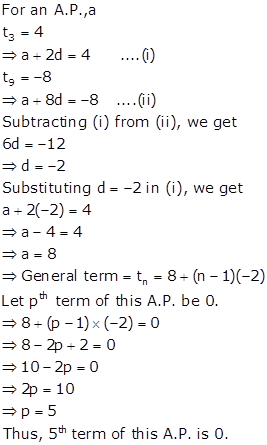
An A.P. consists of 50 terms of which 3rd term is 12 and the last term is 106. Find the 29th term of the A.P.
For a given A.P.,
Number of terms, n = 50
3rd term, t3 = 12
⇒ a + 2d = 12 ….(i)
Last term, l = 106
⇒ t50 = 106
⇒ a + 49d = 106 ….(ii)
Subtracting (i) from (ii), we get
47d = 94
⇒ d = 2
⇒ a + 2(2) = 12
⇒ a = 8
Hence, t29 = a + 28d = 8 + 28(2) = 8 + 56 = 64
Find the arithmetic mean of:
(i) -5 and 41
(ii) 3x - 2y and 3x + 2y
(iii) (m + n)2 and (m - n)2
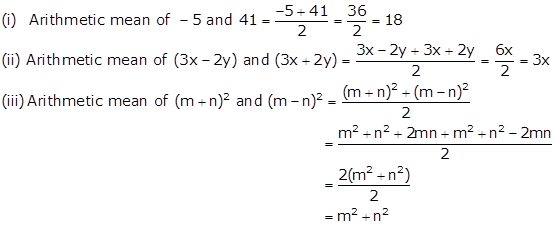
Find the sum of first 10 terms of the A.P.
4 + 6 + 8 + ……
Here,
First term, a = 4
Common difference, d = 6 - 4 = 2
n = 10
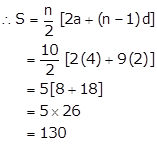
Find the sum of first 20 terms of an A.P. whose first term is 3 and the last term is 57.
Here,
First term, a = 3
Last term, l = 57
n = 20
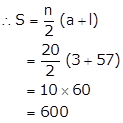
How many terms of the series 18 + 15 + 12 + …….. when added together will give 45?
Here, we find that
15 - 18 = 12 - 15 = -3
Thus, the given series is an A.P. with first term 18 and common difference -3.
Let the number of term to be added be 'n'.

⇒ 90 = n[36 - 3n + 3]
⇒ 90 = n[39 - 3n]
⇒ 90 = 3n[13 - n]
⇒ 30 = 13n - n2
⇒ n2 - 13n + 30 = 0
⇒ n2 - 10n - 3n + 30 = 0
⇒ n(n - 10) - 3(n - 10) = 0
⇒ (n - 10)(n - 3) = 0
⇒ n - 10 = 0 or n - 3 = 0
⇒ n = 10 or n = 3
Thus, required number of term to be added is 3 or 10.
The nth term of a sequence is 8 - 5n. Show that the sequence is an A.P.
tn = 8 - 5n
Replacing n by (n + 1), we get
tn+1 = 8 - 5(n + 1) = 8 - 5n - 5 = 3 - 5n
Now,
tn+1 - tn = (3 - 5n) - (8 - 5n) = -5
Since, (tn+1 - tn) is independent of n and is therefore a constant.
Hence, the given sequence is an A.P.
Find the general term (nth term) and 23rd term of the sequence 3, 1, -1, -3, ….. .
The given sequence is 1, -1, -3, …..
Now,
1 - 3 = -1 - 1 = -3 - (-1) = -2
Hence, the given sequence is an A.P. with first term a = 3 and common difference d = -2.
The general term (nth term) of an A.P. is given by
tn = a + (n - 1)d
= 3 + (n - 1)(-2)
= 3 - 2n + 2
= 5 - 2n
Hence, 23rd term = t23 = 5 - 2(23) = 5 - 46 = -41
Which term of the sequence 3, 8, 13, ........ is 78?
The given sequence is 3, 8, 13, …..
Now,
8 - 3 = 13 - 8 = 5
Hence, the given sequence is an A.P. with first term a = 3 and common difference d = 5.
Let the nth term of the given A.P. be 78.
⇒ 78 = 3 + (n - 1)(5)
⇒ 75 = 5n - 5
⇒ 5n = 80
⇒ n = 16
Thus, the 16th term of the given sequence is 78.
Is -150 a term of 11, 8, 5, 2, ....... ?
The given sequence is 11, 8, 5, 2, …..
Now,
8 - 11 = 5 - 8 = 2 - 5 = -3
Hence, the given sequence is an A.P. with first term a = 11 and common difference d = -3.
The general term of an A.P. is given by
tn = a + (n - 1)d
⇒ -150 = 11 + (n - 1)(-5)
⇒ -161 = -5n + 5
⇒ 5n = 166
![]()
The number of terms cannot be a fraction.
So, clearly, -150 is not a term of the given sequence.
How many two digit numbers are divisible by 3?
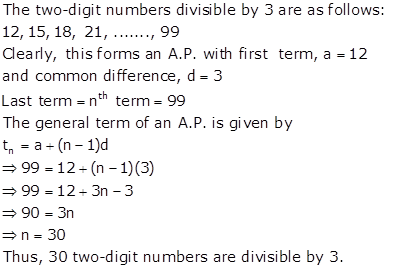
How many multiples of 4 lie between 10 and 250?
The sum of the 4th and the 8th terms of an A.P. is 24 and the sum of the sixth term and the tenth is 44. Find the first three terms of the A.P.
The sum of first 14 terms of an A.P. is 1050 and its 14th term is 140. Find the 20th term.
Let 'a' be the first term and 'd' be the common difference of the given A.P.
Given,
S14 = 1050
![]()
⇒ 7[2a + 13d] = 1050
⇒ 2a + 13d = 150
⇒ a + 6.5d = 75 ….(i)
And, t14 = 140
⇒ a + 13d = 140 ….(ii)
Subtracting (i) from (ii), we get
6.5d = 65
⇒ d = 10
⇒ a + 13(10) = 140
⇒ a = 10
Thus, 20th term = t20 = 10 + 19d = 10 + 19(10) = 200
The 25th term of an A.P. exceeds its 9th term by 16. Find its common difference.
nth term of an A.P. is given by tn= a + (n - 1) d.
⇒ t25 = a + (25 - 1)d = a + 24d and
t9 = a + (9 - 1)d = a + 8d
According to the condition in the question, we get
t25 = t9 + 16
⇒ a + 24d = a + 8d + 16
⇒ 16d = 16
⇒ d = 1
For an A.P., show that:
(m + n)th term + (m - n)th term = 2 × mthterm
Let a and d be the first term and common difference respectively.
⇒(m + n)th term = a + (m + n - 1)d …. (i) and
(m - n)th term = a + (m - n - 1)d …. (ii)
From (i) + (ii), we get
(m + n)th term + (m - n)th term
= a + (m + n - 1)d + a + (m - n - 1)d
= a + md + nd - d + a + md - nd - d
= 2a + 2md - 2d
= 2a + (m - 1)2d
= 2[ a + (m - 1)d]
= 2 × mthterm
Hence proved.
If the nth term of the A.P. 58, 60, 62,.... is equal to the nth term of the A.P. -2, 5, 12, …., find the value of n.
In the first A.P. 58, 60, 62,....
a = 58 and d = 2
tn = a + (n - 1)d
⇒ tn = 58 + (n - 1)2 …. (i)
In the first A.P. -2, 5, 12, ….
a = -2 and d = 7
tn = a + (n - 1)d
⇒ tn= -2 + (n - 1)7 …. (ii)
Given that the nth term of first A.P is equal to the nth term of the second A.P.
⇒58 + (n - 1)2 = -2 + (n - 1)7 … from (i) and (ii)
⇒58 + 2n - 2 = -2 + 7n - 7
⇒ 65 = 5n
⇒ n = 15
Which term of the A.P. 105, 101, 97 … is the first negative term?
Here a = 105 and d = 101 - 105 = -4
Let an be the first negative term.
⇒ an < 0
⇒ a + (n - 1)d < 0
⇒ 105 + (n - 1)(-4)<0
⇒ 105 - 4n + 4 <0
⇒ 109 - 4n < 0
⇒ 109 <4n
⇒ 27.25 < n
The value of n = 28.
Therefore 28th term is the first negative term of the given A.P.
How many three digit numbers are divisible by 7?
The first three digit number which is divisible by 7 is 105 and the last digit which is divisible by 7 is 994.
This is an A.P. in which a = 105, d = 7 and tn = 994.
We know that nth term of A.P is given by
tn = a + (n - 1)d.
⇒ 994 = 105 + (n - 1)7
⇒ 889 = 7n - 7
⇒ 896 = 7n
⇒ n = 128
∴ There are 128 three digit numbers which are divisible by 7.
Divide 216 into three parts which are in A.P. and the product of the two smaller parts is 5040.
Let the three parts of 216 in A.P be (a - d), a, (a + d).
⇒a - d + a + a + d = 216
⇒ 3a = 216
⇒ a = 72
Given that the product of the two smaller parts is 5040.
⇒a(a - d ) = 5040
⇒ 72(72 - d) = 5040
⇒ 72 - d = 70
⇒ d = 2
∴ a - d = 72 - 2 = 70, a = 72 and a + d = 72 + 2 = 74
Therefore the three parts of 216 are 70, 72 and 74.
Can 2n2 - 7 be the nth term of an A.P? Explain.
We have 2n2 - 7,
Substitute n = 1, 2, 3, … , we get
2(1)2 - 7, 2(2)2 - 7, 2(3)2 - 7, 2(4)2 - 7, ….
-5, 1, 11, ….
Difference between the first and second term = 1 - (-5) = 6
And Difference between the second and third term = 11 - 1 = 10
Here, the common difference is not same.
Therefore the nth term of an A.P can't be 2n2 - 7.
Find the sum of the A.P., 14, 21, 28, …, 168.
Here a = 14 , d = 7 and tn = 168
tn = a + (n - 1)d
⇒ 168 = 14 + (n - 1)7
⇒ 154 = 7n - 7
⇒ 154 = 7n - 7
⇒ 161 = 7n
⇒ n = 23
We know that,
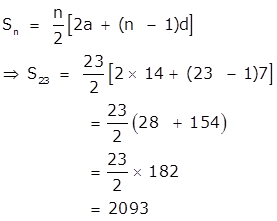
Therefore the sum of the A.P., 14, 21, 28, …, 168 is 2093.
The first term of an A.P. is 20 and the sum of its first seven terms is 2100; find the 31st term of this A.P.
Here a = 20 and S7 = 2100
We know that,
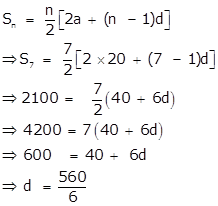
To find: t31 =?
tn = a + (n - 1)d
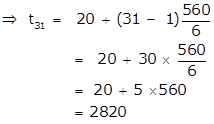
Therefore the 31st term of the given A.P. is 2820.
Find the sum of last 8 terms of the A.P. -12, -10, -8, ……, 58.
First we will reverse the given A.P. as we have to find the sum of last 8 terms of the A.P.
58, …., -8, -10, -12.
Here a = 58 , d = -2
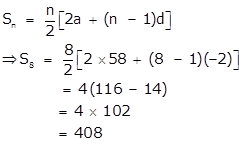
Therefore the sum of last 8 terms of the A.P. -12, -10, -8, ……, 58 is 408.
No comments:
Post a Comment